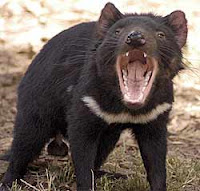Thursday, December 21, 2006
Fancy a Green Christmas
Monday, December 18, 2006
Taz


Sunday, December 17, 2006
Tasmanian Devilry
Although Tasmania is famous for its natural environment and it is home to some of the world's tallest and oldest trees, its old growth forests are being logged at an unsustainable rate and a lot of them are being destroyed and replaced by mono-plantations. Some australia's threathen species (such as giant gum trees and Wedge-tailed Eagle) are also being threatened by these unsustainable logging practices and deforestation.

During my time in Tasmania, I passed through few old growth forests. It is really hard to see from outside about the logging and land clearance areas as the timber industrys are using some tricky "strategies" to avoid public attentions of their partices. A local Tasmanian told me that loggers will only remove the trees in the middle of the forests and they will leave about 5m-10m tree-fronts,which faces to the roads or highways. So, when tourists drive through they can still see a lot of trees and believe that deforestaions problem is sort of overstatement by environmentalists.
However, when i looked down from the plane, I could see there were a lots "big holes" in the middle of the forests, which are resulted from substantial land clearance and logging practices. It is believed that eighty percent of Tasmania's old-growth forests have already fallen victim to logging or development. Only 13% of all the island's Wet Eucalypt Forests are left.
Campaigning to raise public awareness of preventing the logging in Tasmania's old growth forest is always one of the major issue among the environmental NGOs in Australia. Recently, overseas paper companies such as Mitsubishi Paper Mills decided not to accept old-growth woodchips from Tasmania. This was a positive step forward for Tasmania’s environment and encouraging outcomes for the campaigners. However, since the timber industry is a major part of the stagnant Tasmanian economy, generating sales worth more that $1 billion and employing thousands, both the state and federal governments have stepped into the breach in order to protect the state economy. Some logging company even tried to sue protestors into silence.
The battle between NGOs, government and the timber industry is still a long way to go.
More Information: Environmental Destruction in Tasmania
Tasmania Forest Campaigns- The Wilderness Society
TASMANIA FACTS
* Tasmania lies about 155 miles off the south coast of mainland Australia. It is about the same size as Ireland, and its population - 472,000 - is around the same as that of Liverpool.
* Only five per cent of Australia - the driest inhabited continent on Earth - is forested. Much of this is in Tasmania, Australia's southernmost state. Native forest covers around half of the island.
* Endemic, rare and endangered wildlife includes the Tasmanian devil, Forester Kangaroo, Fairy Penguin, Quoll and eleven bird species found nowhere else on Earth. The legendary Tasmanian Tiger, officially declared extinct in 1936, may still survive in remote parts of the ancient forests.
* Tourism in Tasmania - much of it centred on the state's wilderness - provided an
estimated 22,000 jobs in 2004; at least twice as many as the logging industry.TASMANIAN FORESTRY FACTS
* An average of 20,000 hectares of native forest are clearfelled and burned in Tasmania every year.
* 80,000 hectares of native forest have been converted to non-native plantations in the last seven years.
* Tasmania exports more woodchips than every other state in Australia combined; it is the only state that clears and woodchips native rainforest.
* An estimated 90% of wood taken from native forests on public land become woodchips, for export mainly to Japan. No more than 4% become sawn timber.
* In 2003, 14,600 hectares of native forest was clearfelled and burned. Only 6180 hectares - just over 40% - were replanted with native trees. The rest became fast-growing plantations or were converted to 'non-forest use'.
* The rate of logging in Tasmania has quadrupled over the last decade. Logging companies' profits, too, have steadily increased. Logging jobs, meanwhile, have declined. Five thousand jobs have been lost in the last 25 years, as the industry has mechanised and 'downsized.'- Source: Paulkingsnorth.net
Tuesday, December 12, 2006
Tasmania - The Land Apart
 Caption: Wineglass Bay at the East Coast. It is one of the world most photographic scene.
Caption: Wineglass Bay at the East Coast. It is one of the world most photographic scene. "If I was obligated to emigrate I certainly
should prefer this place..."
- Charles Darwin, On visiting Hobart Town aboard The Beagle in 1836
Unfortunately, just heard from the news that there is a serious bushfire in the Northern Tasmania. The fire has already burnt 11,500 hectares and the fire front was 70km wide. It is still not yet sure when the fire can be under controlled. I believed the fire must be a huge one as this news also appeared in Hong Kong's TV. I really hope that the fire will be put out asap with minimal impact to the lovely environment .




More photos: Oz-Tasmania Album


